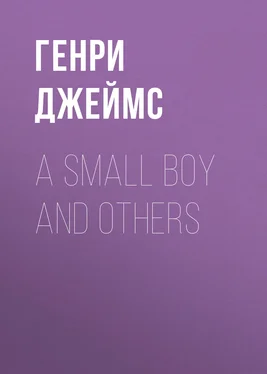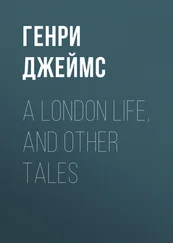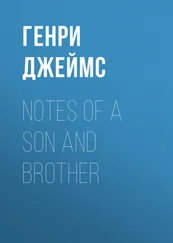Генри Джеймс - A Small Boy and Others
Здесь есть возможность читать онлайн «Генри Джеймс - A Small Boy and Others» — ознакомительный отрывок электронной книги совершенно бесплатно, а после прочтения отрывка купить полную версию. В некоторых случаях можно слушать аудио, скачать через торрент в формате fb2 и присутствует краткое содержание. Жанр: foreign_prose, foreign_antique, на английском языке. Описание произведения, (предисловие) а так же отзывы посетителей доступны на портале библиотеки ЛибКат.
- Название:A Small Boy and Others
- Автор:
- Жанр:
- Год:неизвестен
- ISBN:нет данных
- Рейтинг книги:5 / 5. Голосов: 1
-
Избранное:Добавить в избранное
- Отзывы:
-
Ваша оценка:
- 100
- 1
- 2
- 3
- 4
- 5
A Small Boy and Others: краткое содержание, описание и аннотация
Предлагаем к чтению аннотацию, описание, краткое содержание или предисловие (зависит от того, что написал сам автор книги «A Small Boy and Others»). Если вы не нашли необходимую информацию о книге — напишите в комментариях, мы постараемся отыскать её.
A Small Boy and Others — читать онлайн ознакомительный отрывок
Ниже представлен текст книги, разбитый по страницам. Система сохранения места последней прочитанной страницы, позволяет с удобством читать онлайн бесплатно книгу «A Small Boy and Others», без необходимости каждый раз заново искать на чём Вы остановились. Поставьте закладку, и сможете в любой момент перейти на страницу, на которой закончили чтение.
Интервал:
Закладка:
The glow of this consciousness even in so small an organism was part of the charm of these retreats offered me cityward upon our base of provisions; a part of the rest of which, I disengage, was in my fond perception of that almost eccentrically home-loving habit in my father which furnished us with half the household humour of our childhood—besides furnishing him with any quantity of extravagant picture of his so prompt pangs of anguish in absence for celebration of his precipitate returns. It was traditional for us later on, and especially on the European scene, that for him to leave us in pursuit of some advantage or convenience, some improvement of our condition, some enlargement of our view, was for him breathlessly to reappear, after the shortest possible interval, with no account at all to give of the benefit aimed at, but instead of this a moving representation, a far richer recital, of his spiritual adventures at the horrid inhuman inns and amid the hard alien races which had stayed his advance. He reacted, he rebounded, in favour of his fireside, from whatever brief explorations or curiosities; these passionate spontaneities were the pulse of his life and quite some of the principal events of ours; and, as he was nothing if not expressive, whatever happened to him for inward intensity happened abundantly to us for pity and terror, as it were, as well as for an ease and a quality of amusement among ourselves that was really always to fail us among others. Comparatively late in life, after his death, I had occasion to visit, in lieu of my brother, then in Europe, an American city in which he had had, since his own father's death, interests that were of importance to us all. On my asking the agent in charge when the owner had last taken personal cognisance of his property that gentleman replied only half to my surprise that he had never in all his years of possession performed such an act. Then it was perhaps that I most took the measure of his fine faith in human confidence as an administrative function. He had to have a relation , somehow expressed—and as he was the vividest and happiest of letter-writers it rarely failed of coming; but once it was established it served him, in every case, much better than fussy challenges, which had always the drawback of involving lapses and inattentions in regard to solicitudes more pressing. He incurably took for granted—incurably because whenever he did so the process succeeded; with which association, however, I perhaps overdrench my complacent vision of our summer snatches at town. Through a grave accident in early life country walks on rough roads were, in spite of his great constitutional soundness, tedious and charmless to him; he liked on the other hand the peopled pavement, the thought of which made him restless when away. Hence the fidelities and sociabilities, however superficial, that he couldn't not reaffirm—if he could only reaffirm the others, the really intimate and still more communicable, soon enough afterwards.
It was these of the improvised and casual sort that I shared with him thus indelibly; for truly if we took the boat to town to do things I did them quite as much as he, and so that a little boy could scarce have done them more. My part may indeed but have been to surround his part with a thick imaginative aura; but that constituted for me an activity than which I could dream of none braver or wilder. We went to the office of The New York Tribune—my father's relations with that journal were actual and close; and that was a wonderful world indeed, with strange steepnesses and machineries and noises and hurrying bare-armed, bright-eyed men, and amid the agitation clever, easy, kindly, jocular, partly undressed gentlemen (it was always July or August) some of whom I knew at home, taking it all as if it were the most natural place in the world. It was big to me, big to me with the breath of great vague connections, and I supposed the gentlemen very old, though since aware that they must have been, for the connections, remarkably young; and the conversation of one of them, the one I saw oftenest up town, who attained to great local and to considerable national eminence afterwards, and who talked often and thrillingly about the theatres, I retain as many bright fragments of as if I had been another little Boswell. It was as if he had dropped into my mind the germ of certain interests that were long afterwards to flower—as for instance on his announcing the receipt from Paris of news of the appearance at the Théâtre Français of an actress, Madame Judith, who was formidably to compete with her coreligionary Rachel and to endanger that artist's laurels. Why should Madame Judith's name have stuck to me through all the years, since I was never to see her and she is as forgotten as Rachel is remembered? Why should that scrap of gossip have made a date for my consciousness, turning it to the Comédie with an intensity that was long afterwards to culminate? Why was it equally to abide for me that the same gentleman had on one of these occasions mentioned his having just come back from a wonderful city of the West, Chicago, which, though but a year or two old, with plank sidewalks when there were any, and holes and humps where there were none, and shanties where there were not big blocks, and everything where there had yesterday been nothing, had already developed a huge energy and curiosity, and also an appetite for lectures? I became aware of the Comédie, I became aware of Chicago; I also became aware that even the most alluring fiction was not always for little boys to read. It was mentioned at the Tribune office that one of its reporters, Mr. Solon Robinson, had put forth a novel rather oddly entitled "Hot Corn" and more or less having for its subject the career of a little girl who hawked that familiar American luxury in the streets. The volume, I think, was put into my father's hand, and I recall my prompt desire to make acquaintance with it no less than the remark, as promptly addressed to my companion, that the work, however engaging, was not one that should be left accessible to an innocent child. The pang occasioned by this warning has scarcely yet died out for me, nor my sense of my first wonder at the discrimination—so great became from that moment the mystery of the tabooed book, of whatever identity; the question, in my breast, of why, if it was to be so right for others, it was only to be wrong for me. I remember the soreness of the thought that it was I rather who was wrong for the book—which was somehow humiliating: in that amount of discredit one couldn't but be involved. Neither then nor afterwards was the secret of "Hot Corn" revealed to me, and the sense of privation was to be more prolonged, I fear, than the vogue of the tale, which even as a success of scandal couldn't have been great.
VII
Dimly queer and "pathetic" to me were to remain through much of the after time indeed most of those early indigenous vogues and literary flurries: so few of those that brushed by my childhood had been other than a tinkling that suddenly stopped. I am afraid I mean that what was touching was rather the fact that the tinkle could penetrate than the fact that it died away; the light of criticism might have beat so straight—if the sense of proportion and the fact of compassion hadn't waved it away—on the æsthetic phase during which the appeal was mainly by the tinkle. The Scarlet Letter and The Seven Gables had the deep tone as much as one would; but of the current efforts of the imagination they were alone in having it till Walt Whitman broke out in the later fifties—and I was to know nothing of that happy genius till long after. An absorbed perusal of The Lamplighter was what I was to achieve at the fleeting hour I continue to circle round; that romance was on every one's lips, and I recollect it as more or less thrust upon me in amends for the imposed sacrifice of a ranker actuality—that of the improper Mr. Robinson, I mean, as to whom there revives in me the main question of where his impropriety, in so general a platitude of the bourgeois, could possibly have dwelt. It was to be true indeed that Walt Whitman achieved an impropriety of the first magnitude; that success, however, but showed us the platitude returning in a genial rage upon itself and getting out of control by generic excess. There was no rage at any rate in The Lamplighter, over which I fondly hung and which would have been my first "grown-up" novel—it had been soothingly offered me for that—had I consented to take it as really and truly grown-up. I couldn't have said what it lacked for the character, I only had my secret reserves, and when one blest afternoon on the New Brighton boat I waded into The Initials I saw how right I had been. The Initials was grown-up and the difference thereby exquisite; it came over me with the very first page, assimilated in the fluttered little cabin to which I had retired with it—all in spite of the fact too that my attention was distracted by a pair of remarkable little girls who lurked there out of more public view as to hint that they weren't to be seen for nothing.
Читать дальшеИнтервал:
Закладка:
Похожие книги на «A Small Boy and Others»
Представляем Вашему вниманию похожие книги на «A Small Boy and Others» списком для выбора. Мы отобрали схожую по названию и смыслу литературу в надежде предоставить читателям больше вариантов отыскать новые, интересные, ещё непрочитанные произведения.
Обсуждение, отзывы о книге «A Small Boy and Others» и просто собственные мнения читателей. Оставьте ваши комментарии, напишите, что Вы думаете о произведении, его смысле или главных героях. Укажите что конкретно понравилось, а что нет, и почему Вы так считаете.











